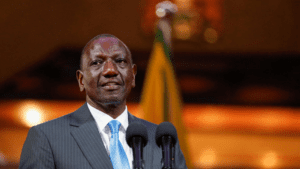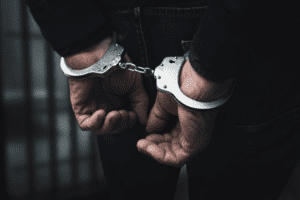
- Busia Senator Okiya Omtatah reported missing after a protest against abductions and enforced disappearances in Nairobi.
- Arrested protesters, including Omtatah, faced a dramatic confrontation with police officers.
- Initial confusion regarding Omtatah’s whereabouts after being detained.
The alarming disappearance of Busia Senator Okiya Omtatah sparked widespread concern and public outrage after reports emerged that he went missing following his arrest during a protest in Nairobi. This incident sheds light on the rising tensions between authorities and activists campaigning against abductions and enforced disappearances of government critics. Here’s a detailed account of the events surrounding Omtatah’s arrest, the ensuing confusion, and his ongoing fight for justice.
Protests Against Abductions
On the evening of Monday, December 30, 2024, a group of activists, including Senator Okiya Omtatah, gathered along Aga Khan Walk in Nairobi’s city center to protest the increasing cases of abductions and enforced disappearances. These cases have predominantly targeted individuals perceived as critics of the government. The demonstration was a response to a worrying trend that has alarmed citizens and human rights organizations alike.
The protesters employed a symbolic act of resistance by chaining themselves together and sitting on the ground. This gesture represented their unity and defiance against the injustices they sought to highlight. The peaceful protest soon escalated when law enforcement officers arrived at the scene in large numbers. Despite the demonstrators’ non-violent stance, tensions flared as police attempted to disperse the group.
Arrests Amid Resistance
The chain link formed by the protesters proved a formidable obstacle for the police, who struggled to separate and detain the participants. After a protracted confrontation, officers resorted to arresting the group en masse. Senator Omtatah and several others were bundled into police vehicles and driven away. This aggressive crackdown drew criticism from onlookers and human rights defenders, who decried the excessive use of force.
Initial Confusion Over Omtatah’s Whereabouts
Following the arrests, Omtatah’s whereabouts became a subject of great concern. Initial reports indicated that he had been taken to Gigiri Police Station for questioning. However, this information was soon contradicted by lawyer Ndegwa Njiru, who visited the station accompanied by NARC Kenya Party leader Martha Karua. Njiru reported that Omtatah was not at Gigiri Police Station and had not been booked there.
“Fellow Kenyans, Senator Omtatah is missing. He was picked up by the police. We, alongside Martha Karua, have been to Gigiri Police Station in search of Senator Omtatah. However, he has not been booked at the station, and his whereabouts remain unknown,” Njiru stated in a social media post.
This revelation intensified public anxiety, with many fearing for the senator’s safety. Activist Harnifa Frasafi, a close ally of Omtatah, corroborated Njiru’s claims, stating that Omtatah was being transported to an undisclosed location. Frasafi’s assertion further fueled speculation about the authorities’ intentions.

Where Omtatah Was Found
Amid mounting pressure and speculation, it was later confirmed that Senator Omtatah was being held at Kamukunji Police Station. Videos circulated online showing the senator seated in a cell, calmly addressing the situation. In the footage, Omtatah’s demeanor suggested resilience, and he assured his supporters that he was “handling” the matter.
The confirmation of Omtatah’s location brought a measure of relief to his supporters, who had camped outside various police stations demanding his release. Despite the senator’s reassurances, his detention underscored the growing tension between state authorities and those advocating for transparency and justice.
A Legal Battle for the Missing
Before his arrest, Senator Omtatah had taken significant legal steps to address the issue of enforced disappearances. Earlier on the same day, he filed a petition in the High Court seeking urgent intervention in the cases of seven youths who had gone missing in December. Represented by his lawyer Philip Langat, Omtatah named the Inspector General of Police, the Directorate of Criminal Investigations (DCI), and the Director of Public Prosecutions (DPP) as respondents in the case.
The petition demanded that the police produce the missing individuals, whether alive or deceased. The names listed in the affidavit included Gideon Kibet, Ronny Kiplagat, Steve Kavingo Mbisi, Billy Mwangi, Peter Muteti, Bernard Kavuli, and Kelvin Muthoni. Omtatah argued that the authorities had a constitutional obligation to account for the whereabouts of the missing persons.
In addition to seeking the production of the missing individuals, the petition proposed an alternative remedy. Omtatah requested that the court order the immediate release of the detainees if they were in custody. He further called for an explanation as to why the individuals should not be granted bail or bond pending investigations.
Symbol of Defiance
Senator Omtatah’s actions have solidified his position as a staunch defender of human rights and accountability. His decision to participate in the protest and file a legal petition highlights his commitment to addressing systemic injustices. However, his arrest and subsequent detention also highlight the challenges faced by activists and public figures who challenge the status quo.
The symbolic nature of the protest, coupled with Omtatah’s high-profile status, has drawn national and international attention to the issue of enforced disappearances in Kenya. Human rights organizations have condemned the government’s heavy-handed response and called for greater transparency in handling such cases.
Public Reaction and Support
The public response to Omtatah’s detention has been overwhelmingly supportive. Citizens, activists, and political leaders have rallied behind the senator, demanding his immediate release and an end to the culture of enforced disappearances. The hashtag #FreeOmtatah trended on social media, with users sharing messages of solidarity and calls for justice.
Martha Karua, a veteran politician and human rights advocate, expressed her dismay over the incident. Speaking to the press, she emphasized the need for the government to respect constitutional rights and uphold the rule of law. “What we are witnessing is a blatant disregard for the rights of citizens. The government must be held accountable for its actions,” Karua stated.
A Growing Trend of Abductions
The incident involving Senator Omtatah is part of a larger pattern of abductions and enforced disappearances that have plagued Kenya in recent years. Human rights groups have documented numerous cases where individuals critical of the government have been abducted under mysterious circumstances. Many of these cases remain unresolved, leaving families and communities grappling with uncertainty and fear.
The rise in such incidents has been attributed to a culture of impunity within the security forces and a lack of accountability mechanisms. Activists have called for comprehensive reforms to address these systemic issues and ensure that all citizens enjoy the protection of their constitutional rights.
Senator Okiya Omtatah’s arrest and the events surrounding his disappearance underscore the urgent need for dialogue and reform in Kenya’s approach to human rights and law enforcement. As a vocal advocate for justice, Omtatah has become a symbol of resistance against oppression and a champion for the voiceless.
The incident also serves as a reminder of the power of collective action. The public outcry and solidarity displayed by Kenyans demonstrate that the fight for justice is far from over. Moving forward, it is essential for the government to address the root causes of these challenges and work towards creating a society where every citizen’s rights are respected and upheld.


